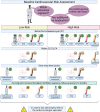Cardiovascular Toxicity of Immune Checkpoint Inhibitors: A Guide for Clinicians
- PMID: 37341925
- PMCID: PMC10442274
- DOI: 10.1007/s40264-023-01320-5
Cardiovascular Toxicity of Immune Checkpoint Inhibitors: A Guide for Clinicians
Abstract
Immune checkpoint inhibitors (ICIs) have revolutionized the treatment and care of patients with cancer owing to unique features, including the occurrence of the so-called immune-related adverse events (irAEs). A multidisciplinary team, possibly including a cardio-oncology specialist, is warranted to achieve a favorable patient outcome. Cardiovascular toxicity, especially myocarditis, emerged as a life-threatening irAE in the real-word setting, and the European Society of Cardiology has recently published the first guideline on cardio-oncology to increase awareness and promote a standardized approach to tackle this complex multimodal issue, including diagnostic challenges, assessment, treatment, and surveillance of patients with cancer receiving ICIs. In this article, through a question & answer format made up of case vignettes, we offer a clinically oriented overview on the latest advancements of ICI-related cardiovascular toxicity, focusing on myocarditis and associated irAEs (myositis and myasthenia gravis within the so-called overlap syndrome), with the purpose of assisting clinicians and healthcare professionals in daily clinical practice.
© 2023. The Author(s).
Conflict of interest statement
The authors declare no potential conflict of interest relevant to the content of the manuscript.
Figures




Similar articles
-
Neuromuscular and cardiac adverse events associated with immune checkpoint inhibitors: pooled analysis of individual cases from multiple institutions and literature.ESMO Open. 2023 Feb;8(1):100791. doi: 10.1016/j.esmoop.2023.100791. Epub 2023 Feb 13. ESMO Open. 2023. PMID: 36791639 Free PMC article.
-
Management of immune-related myocarditis, myositis and myasthenia gravis (MMM) overlap syndrome: a single institution case series and literature review.Front Immunol. 2025 May 8;16:1597259. doi: 10.3389/fimmu.2025.1597259. eCollection 2025. Front Immunol. 2025. PMID: 40406130 Free PMC article. Review.
-
Prognosis of immune checkpoint inhibitors-induced myocarditis: a case series.J Immunother Cancer. 2023 May;11(5):e004792. doi: 10.1136/jitc-2022-004792. J Immunother Cancer. 2023. PMID: 37258037 Free PMC article.
-
[Clinical features of immune checkpoint inhibitor-related myositis in patients with urological cancer].Beijing Da Xue Xue Bao Yi Xue Ban. 2022 Aug 18;54(4):644-651. doi: 10.19723/j.issn.1671-167X.2022.04.010. Beijing Da Xue Xue Bao Yi Xue Ban. 2022. PMID: 35950386 Free PMC article. Chinese.
-
Immune Checkpoint Inhibitor-Induced Myocarditis with Myositis/Myasthenia Gravis Overlap Syndrome: A Systematic Review of Cases.Oncologist. 2021 Dec;26(12):1052-1061. doi: 10.1002/onco.13931. Epub 2021 Aug 25. Oncologist. 2021. PMID: 34378270 Free PMC article.
Cited by
-
Reporting of late-onset immune-related adverse events with immune checkpoint inhibitors in VigiBase.J Immunother Cancer. 2024 Nov 3;12(11):e009902. doi: 10.1136/jitc-2024-009902. J Immunother Cancer. 2024. PMID: 39489542 Free PMC article.
-
Plasma exchange plus glucocorticoids in the treatment of immune checkpoint inhibitor-induced myocarditis: A case series and review.Clin Cardiol. 2023 Dec;46(12):1481-1487. doi: 10.1002/clc.24149. Epub 2023 Sep 12. Clin Cardiol. 2023. PMID: 37698123 Free PMC article. Review.
-
Immune-Related Adverse Events Due to Cancer Immunotherapy: Immune Mechanisms and Clinical Manifestations.Cancers (Basel). 2024 Apr 8;16(7):1440. doi: 10.3390/cancers16071440. Cancers (Basel). 2024. PMID: 38611115 Free PMC article. Review.
-
Unmasking the Rare but Lethal Cardiac Complications of Immune Checkpoint Inhibitor Therapy: A Review of Mechanisms, Risk Factors, and Management Strategies.Curr Treat Options Oncol. 2025 Jul;26(7):605-621. doi: 10.1007/s11864-025-01329-1. Epub 2025 May 24. Curr Treat Options Oncol. 2025. PMID: 40411721 Review.
-
Preoperative inflammatory markers and tumor markers in predicting lymphatic metastasis and postoperative complications in colorectal cancer: a retrospective study.BMC Surg. 2025 Feb 18;25(1):71. doi: 10.1186/s12893-025-02795-y. BMC Surg. 2025. PMID: 39966788 Free PMC article.
References
Publication types
MeSH terms
Substances
LinkOut - more resources
Full Text Sources
Medical

